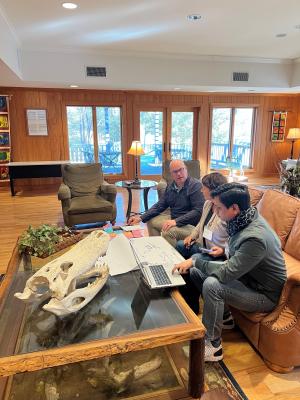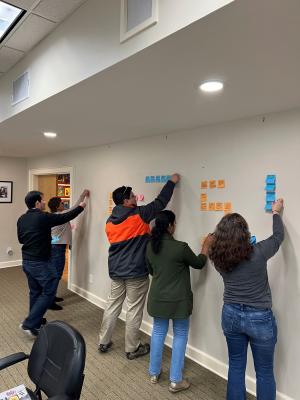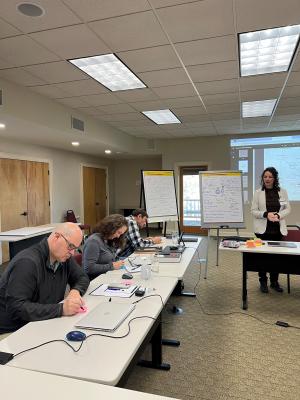CCUS Handbook for Policymakers - Now Available!
Announcing the publication of the CCUS Handbook for Policymakers! The Handbook can be downloaded in full here.
The Handbook is also available in Arabic, Bahasa Indonesia, Malay, Portuguese (European), Thai, and Vietnamese.
In support of the EDGE (Enhancing Development and Growth through Energy) Asia initiative, and sponsored by the US Department of State, Bureau of Energy Resources, CLDP has developed an open-access plain language handbook for policymakers on CCUS. The Handbook is a starting point for understanding the policies, rules, and best practices that countries can adopt and implement for CCUS.
The Handbook was created using the Book Sprints method, in close collaboration with a diverse group of experts from U.S. government agencies, foreign governments, multilateral institutions, industry, civil society, and academia.
Overview of Each Chapter
The authors of the Handbook prepared brief presentations giving a general overview of each chapter of the book. Please find the links to the presentations below.
- Chapter 1: Why Carbon (video link) | Why Carbon? (presentation link)
- Chapter 2: What is Carbon Capture, Transport, Utilization, and Storage? (video link) | What is Carbon Capture, Transport, Utilization, and Storage? (presentation link)
- Chapter 3: CCUS Project Engagement (video link) | CCUS Project Engagement (presentation link)
- Chapter 4: Capacity Building (video link) | Capacity Building (presentation link)
- Chapter 5: Roadmap for Developing Legal and Regulatory Frameworks (video link) | Roadmap for Developing Legal and Regulatory Frameworks (presentation link)
- Chapter 6: Resources and Responsibilities for Frameworks (video link) | Resources and Responsibilities for Frameworks (presentation link)
- Chapter 7: Project-Specific Frameworks (video link) | Project-Specific Frameworks (presentation link)
- Chapter 8: Finance and Incentives (video link) | Finance and Incentives (presentation link)
Technical Assistance for CCUS
The CLDP Energy and Minerals team's CCUS work provides legal technical support to governments on the policy, legal, regulatory, and contractual reforms to attract responsible investment in CCUS.
CCUS presents numerous economic opportunities, including companies increasing oil and gas production while reducing emissions and managing carbon in order to generate tradable carbon credits. U.S. oil and gas exploration, production, and service companies lead in the field of CCUS and other enhanced oil recovery technologies, opening up opportunities for American experts.
However, implementing CCUS raises several regulatory challenges for governments, compliance with international agreements (such as the Paris Climate Accords), as well as contractual arrangements of the various parties. CLDP has the following CCUS-related capabilities:
- Regulatory Review: assess relevant existing local and international legal and regulatory frameworks (such as subsurface rights and liabilities, and carbon credits) to determine regulatory gaps and potential conflicts to be addressed in a CCUS framework. Where new regimes have been proposed, CLDP can provide feedback on draft laws or regulations and comparative written analysis of different countries’ CCUS legal and regulatory frameworks.
- Risk Reduction: advise regulators on (i) assessing the significant risks with respect to CCUS, such as safety, water quality, leakage, mineral arrangements, and financial viability; and (ii) mitigating the risks through effective site characterization, monitoring, evaluation and accounting, financial responsibility, and post-injection monitoring.
- Standards and Technology Overview: present use and ongoing development of CCUS technologies and international standards related to CCUS projects, such as those developed by the International Organization for Standardization (ISO).
- Market Assessment: deliver an assessment of the dynamic global CCUS market, including top utilizers, value prospects, key market players, and regulatory context, to advise the country in the development of a national strategy.
- CCUS Project Finance: advise on financial issues facing CCUS projects, including public/private procurement options, fiscal subsidies and market incentives, relation to green finance, funding sources, cross-border taxation, and carbon credit markets.
Handbook Drafting: Behind-The-Scenes
In January 2024, CLDP staff, alongside experts in CCUS, gathered together in Mississippi to draft the CCUS Handbook.
Please enjoy the below photos of our contributing authors drafting this handbook at Tara Wildlife.





